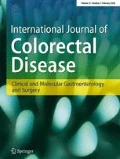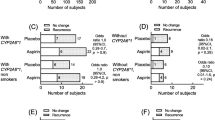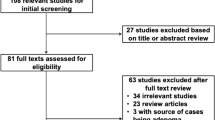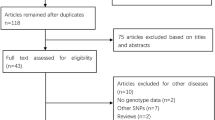Abstract
Purpose
Cyclooxygenase (COX) enzymes, COX1 and COX2, are key in converting arachidonic acid (AA) into prostaglandins that have been associated with colorectal carcinogenesis. The aim of our study was to investigate associations of polymorphisms in COX genes, alone and in interaction with exposures known to be related to inflammation and AA metabolism, with risk of colorectal adenomas.
Materials and methods
In a community-, colonoscopy-based case–control study with 162 incident, sporadic colorectal adenoma cases and 211 controls, we investigated associations of two promoter polymorphisms (−842 A > G in COX1 and −765 G > C in COX2) and two polymorphisms in the 3′-UTR of COX2 (8473 T > C and 9850 A > G) with risk of adenomas. Multiple logistic regression models were used to estimate odds ratios (OR) and 95% confidence intervals (CI) of colorectal adenoma after adjusting for potential confounders.
Results
Overall, there was no evidence for an association between any of the four polymorphisms and colorectal adenomas. However, we found a statistically significant interaction between the COX2 8473 T > C polymorphism and nonsteroidal anti-inflammatory drug (NSAIDs) use (P interaction = 0.03): The greatest reduced risk was observed for individuals with the 8473 C variant allele who also regularly used NSAIDs (OR = 0.35, 95% CI 0.16–0.75).
Conclusion
These results suggest that the C allele of COX2 8473 T > C polymorphism may interact with NSAIDs to reduce risk for colorectal adenoma.
Similar content being viewed by others
References
Potter JD (1999) Colorectal cancer: molecules and populations. J Natl Cancer Inst 91:916–932
Williams CS, Mann M, DuBois RN (1999) The role of cyclooxygenases in inflammation, cancer, and development. Oncogene 18:7908–7916
Jones R, Adel-Alvarez LA, Alvarez OR, Broaddus R, Das S (2003) Arachidonic acid and colorectal carcinogenesis. Mol Cell Biochem 253:141–149
Murakami M, Kudo I (2004) Recent advances in molecular biology and physiology of the prostaglandin E2-biosynthetic pathway. Prog Lipid Res 43:3–35
Prescott SM, Fitzpatrick FA (2000) Cyclooxygenase-2 and carcinogenesis. Biochim Biophys Acta 1470:M69–M78
Chapple KS, Cartwright EJ, Hawcroft G et al (2000) Localization of cyclooxygenase-2 in human sporadic colorectal adenomas. Am J Pathol 156:545–553
Maekawa M, Sugano K, Sano H et al (1998) Increased expression of cyclooxygenase-2 to -1 in human colorectal cancers and adenomas, but not in hyperplastic polyps. Jpn J Clin Oncol 28:421–426
Yoshimatsu K, Golijanin D, Paty PB et al (2001) Inducible microsomal prostaglandin E synthase is overexpressed in colorectal adenomas and cancer. Clin Cancer Res 7:3971–3976
Sheng H, Shao J, Washington MK, DuBois RN (2001) Prostaglandin E2 increases growth and motility of colorectal carcinoma cells. J Biol Chem 276:18075–18081
Kawamori T, Uchiya N, Sugimura T, Wakabayashi K (2003) Enhancement of colon carcinogenesis by prostaglandin E2 administration. Carcinogenesis 24:985–990
Asano TK, McLeod RS (2004) Nonsteroidal anti-inflammatory drugs and aspirin for the prevention of colorectal adenomas and cancer: a systematic review. Dis Colon Rectum 47:665–673
Halushka MK, Walker LP, Halushka PV (2003) Genetic variation in cyclooxygenase 1: effects on response to aspirin. Clin Pharmacol Ther 73:122–130
Papafili A, Hill MR, Brull DJ et al (2002) Common promoter variant in cyclooxygenase-2 represses gene expression: evidence of role in acute-phase inflammatory response. Arterioscler Thromb Vasc Biol 22:1631–1636
Appleby SB, Ristimaki A, Neilson K, Narko K, Hla T (1994) Structure of the human cyclo-oxygenase-2 gene. Biochem J 302(Pt 3):723–727
Dixon DA, Kaplan CD, McIntyre TM, Zimmerman GA, Prescott SM (2000) Post-transcriptional control of cyclooxygenase-2 gene expression. The role of the 3′-untranslated region. J Biol Chem 275:11750–11757
Gong Z, Xie D, Deng Z et al (2005) The PPAR{gamma} Pro12Ala polymorphism and risk for incident sporadic colorectal adenomas. Carcinogenesis 26:579–585
Gong Z, Hebert JR, Bostick RM et al (2007) Common polymorphisms in 5-lipoxygenase and 12-lipoxygenase genes and the risk of incident, sporadic colorectal adenoma. Cancer 109:849–857
O′Brien MJ, Winawer SJ, Zauber AG et al (1990) The National Polyp Study. Patient and polyp characteristics associated with high-grade dysplasia in colorectal adenomas. Gastroenterology 98:371–379
Willett WC, Sampson L, Stampfer MJ et al (1985) Reproducibility and validity of a semiquantitative food frequency questionnaire. Am J Epidemiol 122:51–65
Pereira MA, Fitzgerald SJ, Gregg EW et al (1997) A collection of Physical Activity Questionnaires for health-related research. Med Sci Sports Exerc 29:S1–S205
SAS Institute Inc (2004) SAS Language: Reference, Version 9.1. SAS Institute in Cary, NC. USA
Khoury MJ, James LM (1993) Population and familial relative risks of disease associated with environmental factors in the presence of gene-environment interaction. Am J Epidemiol 137:1241–1250
Agresti A (1996) An introduction to categorical data analysis. Wiley, New York
Cox DG, Pontes C, Guino E et al (2004) Polymorphisms in prostaglandin synthase 2/cyclooxygenase 2 (PTGS2/COX2) and risk of colorectal cancer. Br J Cancer 91:339–343
Koh WP, Yuan JM, van den Berg D, Lee HP, Yu MC (2004) Interaction between cyclooxygenase-2 gene polymorphism and dietary n-6 polyunsaturated fatty acids on colon cancer risk: the Singapore Chinese Health Study. Br J Cancer 90:1760–1764
Tan W, Wu J, Zhang X et al (2007) Associations of functional polymorphisms in cyclooxygenase-2 and platelet 12-lipoxygenase with risk of occurrence and advanced disease status of colorectal cancer. Carcinogenesis 28:1197–1201
Ueda N, Maehara Y, Tajima O, Tabata S, Wakabayashi K, Kono S (2008) Genetic polymorphisms of cyclooxygenase-2 and colorectal adenoma risk: the Self Defense Forces Health Study. Cancer Sci 99:576–581
Ulrich CM, Whitton J, Yu JH et al (2005) PTGS2 (COX-2) -765G > C promoter variant reduces risk of colorectal adenoma among nonusers of nonsteroidal anti-inflammatory drugs. Cancer Epidemiol Biomarkers Prev 14:616–619
Shen J, Gammon MD, Terry MB, Teitelbaum SL, Neugut AI, Santella RM (2006) Genetic polymorphisms in the cyclooxygenase-2 gene, use of nonsteroidal anti-inflammatory drugs, and breast cancer risk. Breast Cancer Res 8:R71
Sorensen M, Autrup H, Tjonneland A, Overvad K, Raaschou-Nielsen O (2005) A genetic polymorphism in prostaglandin synthase 2 (8473, T- > C) and the risk of lung cancer. Cancer Lett 226:49–54
Hu Z, Miao X, Ma H et al (2005) A common polymorphism in the 3′UTR of cyclooxygenase 2/prostaglandin synthase 2 gene and risk of lung cancer in a Chinese population. Lung Cancer 48:11–17
Park JM, Choi JE, Chae MH et al (2006) Relationship between cyclooxygenase 8473T > C polymorphism and the risk of lung cancer: a case-control study. BMC Cancer 6:70
Shahedi K, Lindstrom S, Zheng SL et al (2006) Genetic variation in the COX-2 gene and the association with prostate cancer risk. Int J Cancer 119:668–672
Siezen CL, Bueno-de-Mesquita HB, Peeters PH, Kram NR, van Doeselaar M, van Kranen HJ (2006) Polymorphisms in the genes involved in the arachidonic acid-pathway, fish consumption and the risk of colorectal cancer. Int J Cancer 119:297–303
Siezen CL, van Leeuwen AI, Kram NR, Luken ME, van Kranen HJ, Kampman E (2005) Colorectal adenoma risk is modified by the interplay between polymorphisms in arachidonic acid pathway genes and fish consumption. Carcinogenesis 26:449–457
Ali IU, Luke BT, Dean M, Greenwald P (2005) Allellic variants in regulatory regions of cyclooxygenase-2: association with advanced colorectal adenoma. Br J Cancer 93:953–959
Dixon DA (2004) Dysregulated post-transcriptional control of COX-2 gene expression in cancer. Curr Pharm Des 10:635–646
Wang LH, Hajibeigi A, Xu XM, Loose-Mitchell D, Wu KK (1993) Characterization of the promoter of human prostaglandin H synthase-1 gene. Biochem Biophys Res Commun 190:406–411
McEntee MF, Whelan J (2002) Dietary polyunsaturated fatty acids and colorectal neoplasia. Biomed Pharmacother 56:380–387
Whelan J, McEntee MF (2004) Dietary (n-6) PUFA and intestinal tumorigenesis. J Nutr 134:3421S–3426S
Hebert JR, Clemow L, Pbert L, Ockene IS, Ockene JK (1995) Social desirability bias in dietary self-report may compromise the validity of dietary intake measures. Int J Epidemiol 24:389–398
Kipnis V, Midthune D, Freedman LS et al (2001) Empirical evidence of correlated biases in dietary assessment instruments and its implications. Am J Epidemiol 153:394–403
Acknowledgments
This study was supported by the Public Health Service grant R01CA-51932 from the National Cancer Institute, the National Center for Research Resources grant RR017698 from the National Institutes of Health, Department of Health and Human Services, the American Cancer Society Research Scholar grant RSG-06-122-01-CNE, and a Georgia Cancer Coalition Distinguished Scholar award (to R. Bostick), and National Cancer Institute, Center for Research and Cancer Health Disparities grant 1 U01 CA114601-01 (to JR Hebert).
Conflict of interest
The authors declare that they have no conflict of interest.
Author information
Authors and Affiliations
Corresponding author
Rights and permissions
About this article
Cite this article
Gong, Z., Bostick, R.M., Xie, D. et al. Genetic polymorphisms in the cyclooxygenase-1 and cyclooxygenase-2 genes and risk of colorectal adenoma. Int J Colorectal Dis 24, 647–654 (2009). https://doi.org/10.1007/s00384-009-0656-8
Accepted:
Published:
Issue Date:
DOI: https://doi.org/10.1007/s00384-009-0656-8




